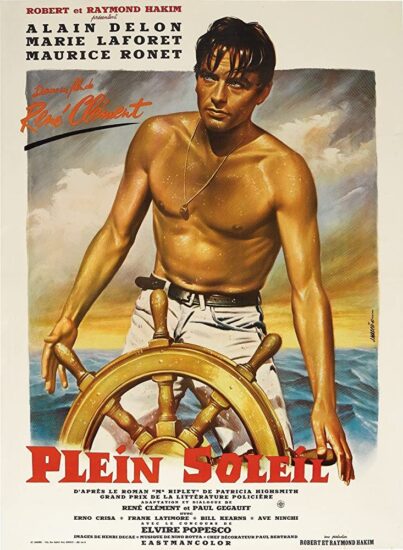 This 1960 French-Italian co-production is not the masterpiece many folks might have you believe, but it is the closest the screen has come to properly dramatizing THE TALENTED MR. RIPLEY by Patricia Highsmith. Initially published in 1955, the novel was the first in Highsmith’s “Ripliad” cycle—which included RIPLEY UNDER GROUND (1970), RIPLEY’S GAME (1974), THE BOY WHO FOLLOWED RIPLEY (1980) and RIPLEY UNDER WATER (1991)—headlined by Tom Ripley, a wealthy socialite who wasn’t above using petty theft and murder to maintain his status. That Highsmith made Ripley the hero of these books was the primary reason for her “controversial” status in American fiction (it’s a fact that many prominent writers refused to have their stories appear in anthologies in which Highsmith was represented).
This 1960 French-Italian co-production is not the masterpiece many folks might have you believe, but it is the closest the screen has come to properly dramatizing THE TALENTED MR. RIPLEY by Patricia Highsmith. Initially published in 1955, the novel was the first in Highsmith’s “Ripliad” cycle—which included RIPLEY UNDER GROUND (1970), RIPLEY’S GAME (1974), THE BOY WHO FOLLOWED RIPLEY (1980) and RIPLEY UNDER WATER (1991)—headlined by Tom Ripley, a wealthy socialite who wasn’t above using petty theft and murder to maintain his status. That Highsmith made Ripley the hero of these books was the primary reason for her “controversial” status in American fiction (it’s a fact that many prominent writers refused to have their stories appear in anthologies in which Highsmith was represented).
PURPLE NOON (Plein soleil) is far from a straight adaptation, yet the film was given high praise by Highsmith (not an easy person to please). The director was France’s René Clément, back when he was one of the world’s greatest filmmakers (i.e. before he became a journeyman thriller specialist in the 1970s), and the French superstar Alain Delon took the lead role.
Delon’s Tom Ripley is an absurdly good looking young “American” man afoot in Italy, where he’s been sent by the parents of Philippe Greenleaf (Maurice Ronet). Ripley is an old friend of Philippe, who’s currently squandering his trust fund, with Ripley dispatched to lure Philippe back to America. Ripley and Philippe commence a borderline-gay relationship, complicated by the fact that Ripley is a sociopath who likes dressing up in Philippe’s clothes. He also has a thing for Philippe’s girlfriend Marge (Marie Laforêt).

During a boating trip Ripley romances Marge and admits to Philippe that he’s been forging his signature on checks, and is planning on taking over his friend’s identity. Then, after letting Marge off at a port, Ripley puts his plan into action by stabbing Philippe to death, dumping the corpse in the ocean and piloting the boat back to shore. From there Ripley gets busy creating a fake passport and writing letters to Marge in Philippe’s voice. He also bludgeons to death Philippe’s friend Freddie when the latter begins to suspect Ripley’s ruse, and goes to great lengths to dispose of the body.
More trouble looms in the form of a pesky police inspector, and also from Marge. She doesn’t buy Ripley’s claim that Philippe committed suicide, and isn’t too enchanted with Ripley’s romantic overtures. It seems she might be fated to meet the same fate as Philippe and Freddie, but Ripley has feelings for her that stretch beyond his impersonation.
The film is expertly directed, even if it doesn’t have the passion of René Clément classics like FORBIDDEN GAMES (1952) and GERVAISE (1956). On display is Clément’s widely celebrated talent for Hitchcockian suspense, paired with an ability to maintain audience attention during outwardly uneventful sequences. Clément also has an eye for telling detail, as in a scene in which Ripley-as-Philippe charms a hotel maid, which continues after the interaction has grown awkward.
The film is enormously atmospheric, with the hedonistic aura of early 1960s Rome (the “La Dolce Vita” era) superbly captured via sun-bleached scenery that offsets the story’s dark arc. Alain Delon, in the role that cemented his stardom in Europe, emerges as the screen’s preeminent Tom Ripley (outdoing subsequent interpretations by Dennis Hopper, Matt Damon, John Malkovich and Andrew Scott), sporting a near angelic appearance that masks a profoundly twisted nature (this guy would never cry when killing someone, as Matt Damon’s Ripley does in Anthony Minghella’s misguided 1999 take on the same material).
It’s Ripley’s viewpoint that predominates, with much of the suspense contained in his attempts at covering up his killings and outwitting authorities. In this way Clément is very true to Highsmith’s bleak vision, although he doesn’t entirely capture the source novel’s demented brilliance. What keeps him from doing so, and the reason the film falls short of greatness, is the lack of emotional resonance. For all its technical virtuosity the film is never terribly shocking or even involving, being much like its main character: cold, calculating and very hard to relate to.
Vital Statistics
PURPLE NOON (Plein soleil)
Robert et Raymond Hakim
Director: René Clément
Producer: Robert & Raymond Hakim
Screenplay: René Clément, Paul Gégauff
(Based on a novel by Patricia Highsmith)
Cinematography: Henri Decaë
Editing: Françoise Javet
Cast: Alain Delon, Marie Laforêt, Maurice Ronet, Elvira Popescu, Erno Crisa, Frank Latimore, Billy Kearns, Ave Ninchi, Viviane Chantel, Nerio Bernardi, Barbel Fanger, Lily Romanelli, Nicolas Petrov
